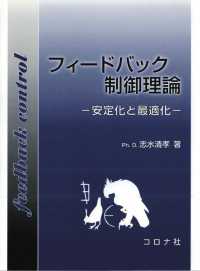基本説明
In Lexical Analysis, Patrick Hanks offers a wide-ranging empirical investigation of word use and meaning in language. Hanks offers a new theory of language, the Theory of Norms and Exploitations (TNE), which makes a systematic distinction between normal and abnormal usage - between rules for using words normally and rules for exploiting such norms in metaphor and other creative use of language. Using hundreds of carefully chosen citations from corpora and other texts, he shows how matching each use of a word against established contextual patterns plays a large part in determining the meaning of an utterance.
Full Description
A lexically based, corpus-driven theoretical approach to meaning in language that distinguishes between patterns of normal use and creative exploitations of norms.In Lexical Analysis, Patrick Hanks offers a wide-ranging empirical investigation of word use and meaning in language. The book fills the need for a lexically based, corpus-driven theoretical approach that will help people understand how words go together in collocational patterns and constructions to make meanings. Such an approach is now possible, Hanks writes, because of the availability of new forms of evidence (corpora, the Internet) and the development of new methods of statistical analysis and inferencing. Hanks offers a new theory of language, the Theory of Norms and Exploitations (TNE), which makes a systematic distinction between normal and abnormal usage-between rules for using words normally and rules for exploiting such norms in metaphor and other creative use of language. Using hundreds of carefully chosen citations from corpora and other texts, he shows how matching each use of a word against established contextual patterns plays a large part in determining the meaning of an utterance. His goal is to develop a coherent and practical lexically driven theory of language that takes into account the immense variability of everyday usage and that shows that this variability is rule governed rather than random. Such a theory will complement other theoretical approaches to language, including cognitive linguistics, construction grammar, generative lexicon theory, priming theory, and pattern grammar.








